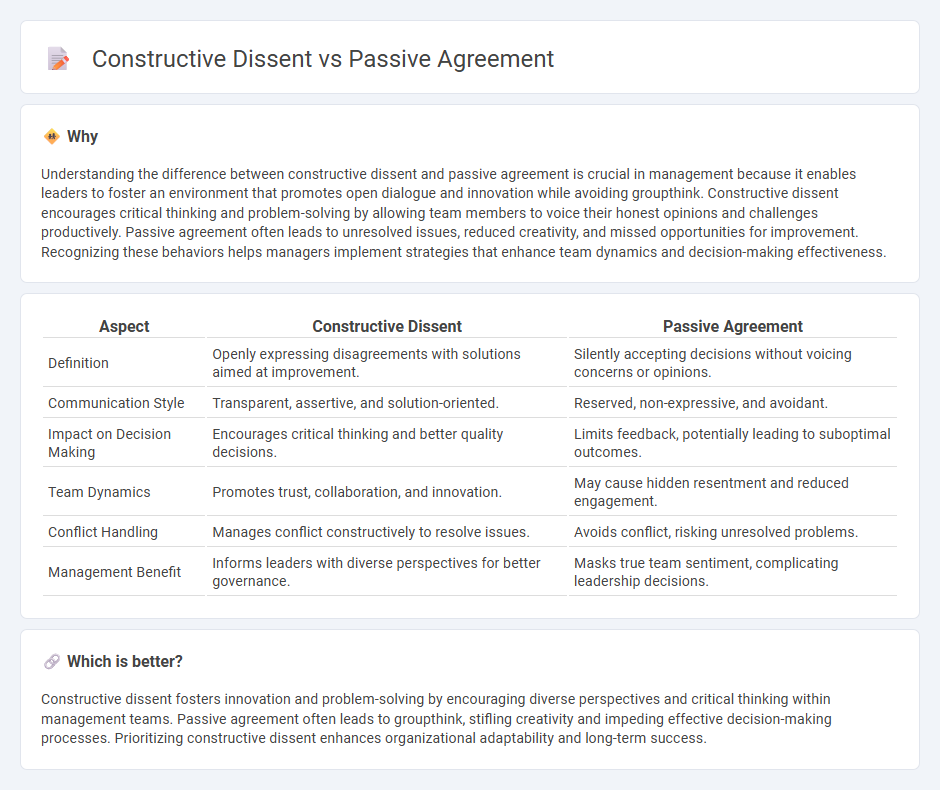
Constructive dissent encourages open dialogue and critical thinking by challenging ideas and fostering innovation in management practices. This approach contrasts with passive agreement, which often leads to groupthink, reduced creativity, and missed opportunities for improvement. Explore the benefits of constructive dissent to enhance decision-making and organizational growth.
Why it is important
Understanding the difference between constructive dissent and passive agreement is crucial in management because it enables leaders to foster an environment that promotes open dialogue and innovation while avoiding groupthink. Constructive dissent encourages critical thinking and problem-solving by allowing team members to voice their honest opinions and challenges productively. Passive agreement often leads to unresolved issues, reduced creativity, and missed opportunities for improvement. Recognizing these behaviors helps managers implement strategies that enhance team dynamics and decision-making effectiveness.
Comparison Table
| Aspect | Constructive Dissent | Passive Agreement |
|---|---|---|
| Definition | Openly expressing disagreements with solutions aimed at improvement. | Silently accepting decisions without voicing concerns or opinions. |
| Communication Style | Transparent, assertive, and solution-oriented. | Reserved, non-expressive, and avoidant. |
| Impact on Decision Making | Encourages critical thinking and better quality decisions. | Limits feedback, potentially leading to suboptimal outcomes. |
| Team Dynamics | Promotes trust, collaboration, and innovation. | May cause hidden resentment and reduced engagement. |
| Conflict Handling | Manages conflict constructively to resolve issues. | Avoids conflict, risking unresolved problems. |
| Management Benefit | Informs leaders with diverse perspectives for better governance. | Masks true team sentiment, complicating leadership decisions. |
Which is better?
Constructive dissent fosters innovation and problem-solving by encouraging diverse perspectives and critical thinking within management teams. Passive agreement often leads to groupthink, stifling creativity and impeding effective decision-making processes. Prioritizing constructive dissent enhances organizational adaptability and long-term success.
Connection
Constructive dissent fosters critical thinking and innovation by encouraging open dialogue and diverse viewpoints, while passive agreement often stifles creativity by suppressing genuine feedback. In effective management, balancing these dynamics enhances decision-making processes and organizational adaptability. Recognizing and channeling dissent constructively prevents passive agreement from leading to groupthink and missed opportunities.
Key Terms
Groupthink
Passive agreement in groupthink results in conformity without critical evaluation, leading to poor decision-making. Constructive dissent encourages diverse viewpoints and critical analysis, reducing the risk of faulty consensus. Discover how fostering constructive dissent can enhance group decision processes and prevent groupthink.
Innovation
Passive agreement often stifles innovation by limiting diverse perspectives, leading to minimal challenge of the status quo and reduced creative problem-solving. Constructive dissent fosters a culture of open dialogue and critical thinking, encouraging the exploration of novel ideas and driving breakthrough innovations. Discover how embracing constructive dissent can transform your organization's innovation potential.
Psychological Safety
Passive agreement often stems from fear of negative consequences, undermining psychological safety by fostering silence and inhibiting honest dialogue. Constructive dissent promotes open communication and trust, enhancing psychological safety by encouraging diverse perspectives and collaborative problem-solving. Explore how balancing these dynamics can improve team performance and well-being.
Source and External Links
Types of Persuasive Speeches - This webpage discusses passive agreement in the context of persuasive speeches, focusing on gaining audience agreement without requesting action.
Legal Term for Passive Agreement - This webpage explains passive consent, particularly in online contexts, where users agree without taking explicit actions like clicking a button.
Passive Agreement Synonyms - This webpage provides synonyms for passive agreement, including terms like mindless agreement, blind agreement, and lukewarm acceptance.
 dowidth.com
dowidth.com